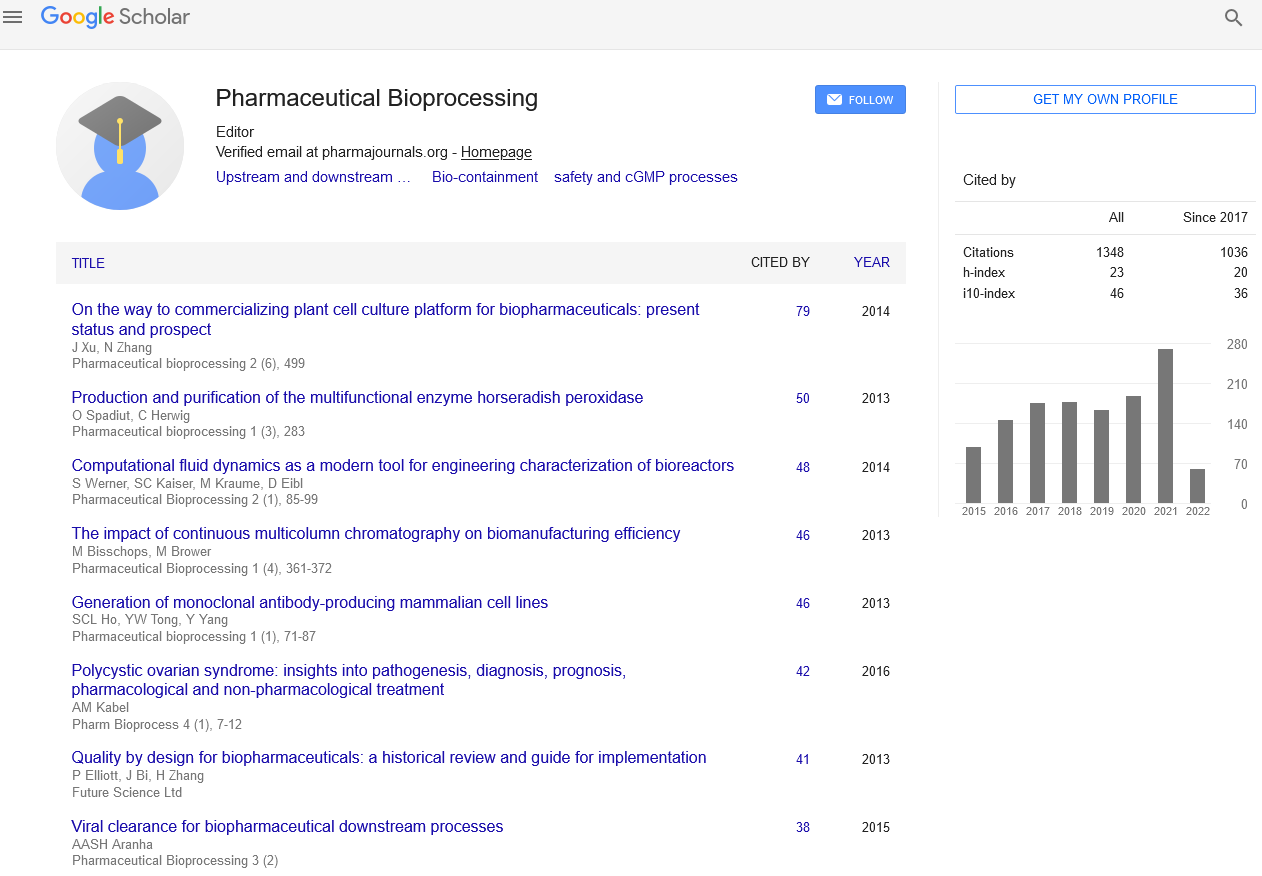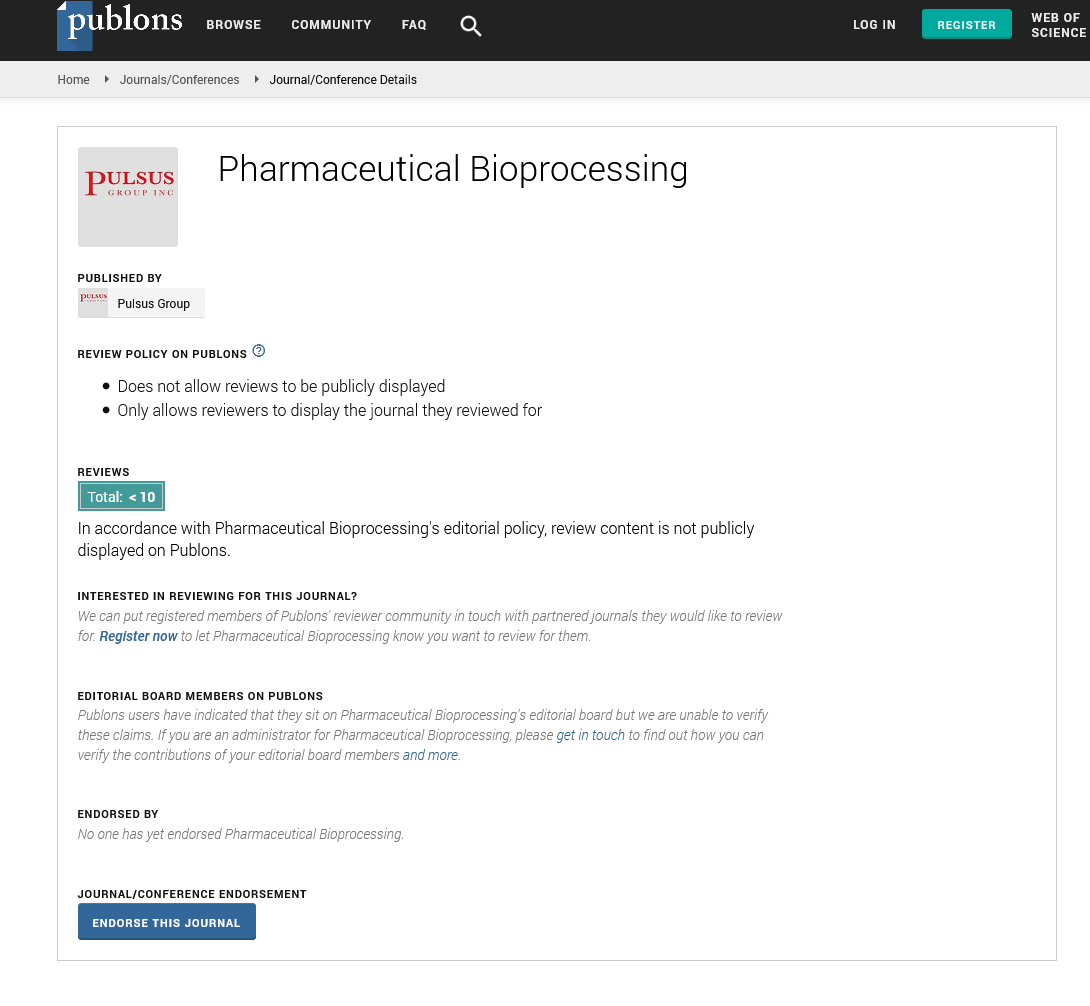Perspective - Pharmaceutical Bioprocessing (2024) Volume 12, Issue 6
Scale-Up and Automation: Transforming Industry Through Efficiency and Innovation
- Corresponding Author:
- Hamilton Cabral
Department of Pharmacy,
University of Sao Paulo,
Sao Paulo,
Brazil
E-mail: herbert_dichtel@biotest.de
Received: 19-Nov-2024, Manuscript No. fmpb-24-152846; Editor assigned: 22-Nov-2024, PreQC No. fmpb-24-152846 (PQ); Reviewed: 06-Dec-2024, QC No. fmpb-24-152846; Revised: 10- Dec-2024, Manuscript No. fmpb-24-152846 (R); Published: 28-Dec-2024, DOI: 10.37532/2048-9145.2024.12(6). 242-243
Introduction
In today’s competitive landscape, scale-up and automation stand as pivotal processes driving efficiency, innovation and sustainability in various industries. From manufacturing to biotechnology, these approaches enable businesses to meet growing demands, reduce operational costs and enhance product quality. This article explores the concept of scale-up and automation, their applications, benefits, challenges and their transformative role across sectors.
Description
Understanding scale-up and automation
Scale-up refers to the process of expanding production from a smaller, pilot scale to a larger, commercial scale. This involves replicating and optimizing processes to ensure that increased production levels maintain the same quality and efficiency as smaller-scale operations. Scale-up is crucial in industries like pharmaceuticals, where producing a drug in sufficient quantities while adhering to stringent quality standards is vital.
Automation, on the other hand, involves using technology and machinery to perform tasks with minimal human intervention. Automation is integrated into systems to streamline operations, improve accuracy and reduce human error. It encompasses robotics, Artificial Intelligence (AI) and advanced software solutions, making it a cornerstone of modern industrial practices.
Applications of scale-up and automation
The impact of scale-up and automation is evident in diverse industries, including:
Pharmaceuticals and biotechnology: In these sectors, scale-up is critical for manufacturing drugs and vaccines. Automation technologies, such as robotic dispensing and high-throughput screening, accelerate drug discovery and production processes.
Manufacturing: Industries employ automation in assembly lines to enhance precision and consistency. Scale-up ensures that increased demand for products can be met without compromising on quality.
Food and beverage: Automation in food processing ensures hygiene and efficiency, while scale-up facilitates mass production to cater to a growing population.
Renewable energy: Scale-up in solar panel or wind turbine production is essential to meet global energy demands. Automation improves the efficiency and reliability of production processes.
Agriculture: Automated farming equipment and IoT devices revolutionize farming, while scaleup supports larger yields to address food security challenges.
Automotive industry: Automation, including robotic arms and AI-driven quality checks, supports the production of vehicles on a massive scale.
Benefits of scale-up and automation
The integration of scale-up and automation delivers numerous advantages:
Increased efficiency: Automation speeds up processes, reduces cycle times and minimizes downtime.
Cost reduction: Scaling up production lowers per-unit costs through economies of scale, while automation reduces labor costs.
Improved quality: Automated systems ensure consistency and precision, reducing the likelihood of defects.
Faster time-to-market: In industries like pharmaceuticals, scale-up and automation shorten the timeline from research to commercial production.
Resource optimization: Automated systems efficiently use raw materials, reducing waste and promoting sustainability.
Enhanced safety: Automation reduces the need for human involvement in hazardous processes, minimizing workplace injuries.
Adaptability: Scalable and automated systems can quickly adjust to market demands and new innovations.
Challenges in implementation
While the benefits are substantial, implementing scale-up and automation comes with challenges:
High initial costs: Automation systems and scale-up infrastructure require significant capital investment.
Technical complexity: Designing scalable processes and integrating automation technologies demand specialized expertise.
Workforce displacement: Automation can lead to job losses in roles that become redundant, raising ethical and economic concerns.
Maintenance and upgrades: Automated systems require regular maintenance and updates to remain efficient and relevant.
Regulatory compliance: In industries like healthcare, scaling up production while adhering to regulatory standards is a complex process.
Data security: Automation often involves interconnected systems, making them vulnerable to cybersecurity threats.
Resistance to change: Organizational resistance can slow the adoption of scale-up and automation, particularly in traditional industries.
Strategies for successful integration
To maximize the benefits of scale-up and automation, businesses should consider the following strategies:
Thorough planning: Detailed planning ensures that scale-up and automation align with organizational goals.
Pilot testing: Testing on a smaller scale helps identify potential issues before full-scale implementation.
Investing in training: Upskilling employees to work alongside automated systems fosters a collaborative work environment.
Collaborating with experts: Partnering with automation and process optimization specialists ensures seamless integration.
Adopting modular systems: Modular automation allows businesses to scale up gradually, reducing initial financial burdens.
Emphasizing sustainability: Incorporating green technologies into automated systems promotes environmental stewardship.
Conclusion
Scale-up and automation are indispensable in today’s fast-paced industrial landscape. By enabling businesses to enhance efficiency, reduce costs and maintain quality, these processes drive innovation and competitiveness. However, their successful implementation requires overcoming challenges such as high costs, technical complexities and workforce adaptation. As technology continues to evolve, scale-up and automation will play an increasingly vital role in shaping sustainable and efficient industries of the future.


